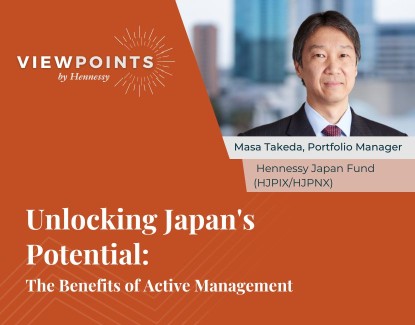Compelling Valuations and Outlook for Japanese Equities
Hennessy Japan Fund Portfolio Manager Masa Takeda shares his insights on the Japanese economy, reform initiatives, and his outlook and valuations for Japanese equities. He also describes the importance of active management when investing in Japan.
-
 Masakazu Takeda, CFA, CMAPortfolio Manager
Masakazu Takeda, CFA, CMAPortfolio Manager
Masa Takeda:
Looking ahead on the positive side, the labor market remains quite strong still. The unemployment rate of 2.4% which is the lowest level in 26 years. However, real wage growth still remains weak, only a fraction of a percent, and the CPI inflation reading is still less than half of the government's target. So in that regard, Japan has still a long way to go.
Structural Reform Initiatives
Masa Takeda:
Last year we were again very productive in terms of passing new bills. In June, a series of job market reforms was passed, and more recently last December, a low-skill foreign worker acceptance law was passed, and this went into effect April this year. We think these are very important steps for Japan, which often ranks as one of the lowest labor productivity countries among OECD nations.
Naturally Hedged Portfolio
Masa Takeda:
Our portfolio is heavily invested in Japanese global companies, and that is a conscious decision on our part. Given the mature state of the Japanese economy, we believe global businesses have the best chance of growth for many years to come. And, that leaves the portfolio somewhat sensitive to currency risk, but we think that our portfolio is naturally hedged. And what I mean by that is from the U.S. dollar investors' point of view, if the yen depreciates, that will reduce the dollar return on equity, but it will enhance the international competitiveness of the businesses that we own. So the investors are compensated by this. The high-quality companies that we own have the ability to overcome the currency headwind over the long haul.
Outlook for Japanese Equities
Masa Takeda:
We think Japan offers some of the most globally competitive companies in the world and those companies are exposed to not just developed countries but also emerging countries. Through our Fund, investors can benefit from growth opportunities provided by these companies, with greater transparency, greater corporate governance, better moats, better liquidity with reasonable valuations. In terms of valuations, Japan has gotten more attractive over the last six to 12 months. Currently Japan is trading at the lowest level in the last few years.
Why Active Management Matters in Japan
Masa Takeda:
If you look at the Index, compared to the U.S., the TOPIX for example, it is still dominated by mature, large old school companies that have no growth: traditional manufacturing, financials, telcos. But, if you look under the hood, there are a lot of hidden gems, even within the large-cap universe, high growth companies that are going very, very global. Japan is still a big mystery, with its language or corporate culture. SPARX, with local presence, we know the inner workings of corporate Japan. At SPARX, we are specializing in this business for the last 30 years.
- In this insight:
- Japan
- Japan Fund
You might also like
-
 Viewpoint
ViewpointJapan's Economic Transformation: Insights on Markets, Tariffs, and Active Management
 Masakazu Takeda, CFA, CMAPortfolio ManagerWatch the Video
Masakazu Takeda, CFA, CMAPortfolio ManagerWatch the VideoWith market volatility expected to persist, what are the key factors driving Japanese equities resilience? Explore the Japanese market with Masa Takeda, Portfolio Manager of the Hennessy Japan Fund. He analyzes the effects of U.S. tariffs, the yen’s movements, and the implications of Japan’s move away from deflation. Get an overview of the potential strategic investment opportunities in companies like Tokyo Marine and Orix, and gain insights into the current situation of Seven & i Holdings.
-
 Portfolio Perspective
Portfolio Perspective
Japan Small Cap FundFinding Compelling Japanese Small-Caps
 Takenari Okumura, CMAPortfolio Manager
Takenari Okumura, CMAPortfolio Manager Tadahiro Fujimura, CFA, CMAPortfolio ManagerRead the Commentary
Tadahiro Fujimura, CFA, CMAPortfolio ManagerRead the CommentaryThe Portfolio Managers discuss their bottom-up approach to identifying undervalued small-cap companies and where they are currently finding opportunity.
-
 Portfolio Perspective
Portfolio Perspective
Japan FundBullish on Globally Oriented Japanese Companies
 Masakazu Takeda, CFA, CMAPortfolio Manager
Masakazu Takeda, CFA, CMAPortfolio Manager Angus Lee, CFAPortfolio ManagerRead the Commentary
Angus Lee, CFAPortfolio ManagerRead the CommentaryIn the following commentary, the Hennessy Japan Fund Portfolio Managers share their thoughts on the current increased market volatility, portfolio updates, and their optimism on globally oriented Japanese companies.
